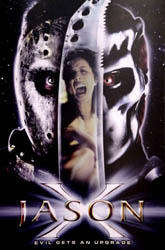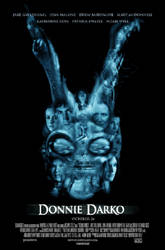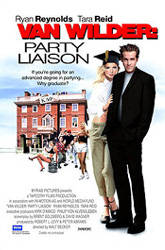 Director: Starring:
OTHER REVIEWS: Ghosts
of Mars 13 Ghosts Valentine Virus |
Jason X BY: DAVID PERRY The Friday the 13th had outstayed its welcome nine features ago, and yet producer Sean S. Cunningham continues to make them. Jason X, the first film to drop the Friday the 13th moniker, could be the worst of the bunch, a tough title to get considering how horrid all of the other entries in the series have been. The main defense of these films is that they are creations set in stone: a deep woods camp, horny camp counselors, some obligatory nudity, and an axe-welding psychopath, anything else is completely unneeded to make a Friday film work for series fans. But Cunningham and his films are nothing compared to the work of Moustapha Akkad (the Halloween series) and Robert Shaye (the A Nightmare on Elm Street series), even though those two producers have created some repugnant entries (Halloween III: Season of the Witch? Nightmare on Elm Street, Part 2: Freddy's Revenge?). I hated the first "Jason" film (a "D" grade, to be exact), and it's the best of the series! Jason X comes from the same thought process that made Leprechaun 4: In Space and Hellraiser: Bloodline, sending Jason Voorhees to the future. Through cryogenic freezing, the man in the plastic mask (Hodder) is sent to 2455 when Earth has become a wasteland unable to maintain livable conditions for plants or animals. The human race has moved to another planet, Earth 2, and created a civilization that both relinquishes and wonders at its old home. A group of university students have been brought to Earth 1 to study its current conditions and happen to find the Crystal Lake Research Center, where Jason and a near-victim, young and sexy scientist Rowan (Doig), have been frozen. Though Rowan is savable, they believe the miniscule mind and condition of Jason's cadaver make his resuscitation impossible. They, as everyone in the audience expects, are wrong. The idea that a horror film can work in space has been proven with Ridley Scott's Alien, but the route Jason X goes in makes for ridiculous and redundant cinema. Even those who love the series and its dedication to the Friday the 13th clichés will be disappointed by the film's lack of much of the old ambiance. The iconoclastic steel of the film's spaceship is nothing compared to the murky fog of Crystal Lake. Hell, the Manhattan of the eighth entry was more akin to the Jason atmosphere than that of Jason X. Many may want to see this film because of its much publicized (at least considering the little press this film has gotten) recreation of Jason's signature suit. If spiffying up something that is already deviant enough with a less frightening metallic gleam is called a step-up, than the new Jason might be considered a success. However, any normal glance would equate this new suit to Michael Myers trashing his William Shatner mask for a Jimmy Carter disguise. Acting has never been a high point in these films, with only Kane Hodder standing as the most recognizable name in the series. With Hodder's supposedly increasing creative control on the productions, Jason X feels like a star vehicle without the star. The Jason of Jason X is the antithesis of the first film (even if he was not around for that one): where the scarier version kept the killer unseen and therefore more upsetting, this new version is tailor-made to scoff at the camera with emotionless eyes. It's alarming that Hodder presents himself as the ultimate Jason (as the film, probably at his request, credits him: über-Jason) when he is playing a role that literally only needs a tall man with a poor disposition to play the part. Hooder has been behind the hockey mask four times, but nearly any stunt coordinator (the occupation by which Hodder got the job) would and could happily play the role with little discernable difference in the performance. The last film, Jason Goes to Hell: The Final Friday,
was supposed to be the ending of the pain and anguish that comes with the release of new Friday
the 13th films. Unfortunately, Jason X proves that once again that a title
with closure like Star Trek V: The Final Frontier and Freddy's Dead: The
Final Nightmare mostly bear more progeny. The difference is that Star Trek V
and Freddy's Dead both spawned superior sequels, while Jason X only
reminds us that Indiana Jones and the Last Crusade is still without a next
chapter. |






